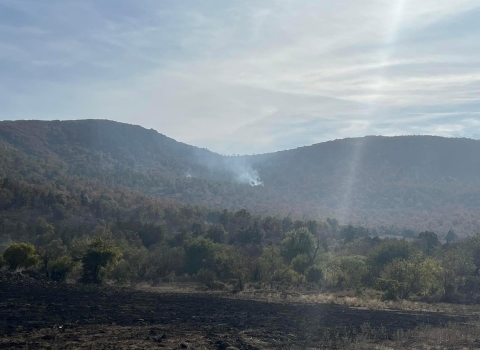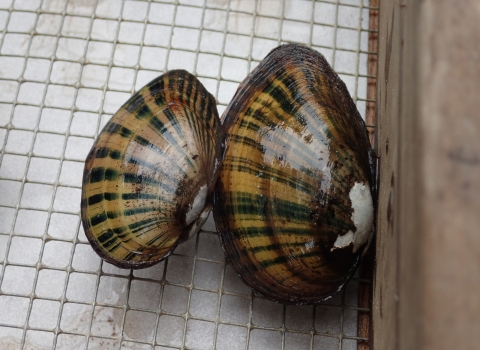Press Release
Get Set for Summer in the National Wildlife Refuge System
June brings long days, a warm sun and a green lushness to nature in National Wildlife Refuges. It also brings a host of fun outdoor activities for the whole family. Take the kids to a free fishing derby. Take a hike or canoe trip. Or attend some more off-beat events.
The National Wildlife Refuge System, managed by the U.S. Fish and Wildlife Service, is the world's premier system of public lands and waters set aside to conserve America's fish, wildlife and plants. There is a National Wildlife Refuge within an hour's drive of most major cities.
A complete list of refuge activities and special events is available at: http://www.fws.gov/refuges/SpecialEvents/FWS_SpecialEvents_Search.cfm.
Animal Dads of Note
Good dads make the going easier, as we recognize Father's Day on Sunday, June 20. That's also true in the wild where some animal dads? flare for parenting can make the difference between life and death.
Here are just a few devoted animal dads and some National Wildlife Refuges where they live.
Role model: Red fox (Vulpes vulpes)
Reason: The male of the species is an attentive father, especially in the first month after birth. While the female nurse the cubs, the father performs the hunting duties and brings food back to the den every four to six hours. But this father does more than bring home the bacon; he also plays with their pups, and as they get older and stronger, he teaches them to hunt and hide from predators. Meal service ends when the pups reach three months in age.
Some refuges where you may spot this dad in action: Seatuck Refuge, NY; Innoko Refuge Alaska; Missisquoi Refuge, Vermont; Stewart B. McKinney Refuge, Connecticut.
Role model: Great horned owl (Bubo virginianus)
Reason: While his mate warms their clutch of eggs, the male owl catches small rodents to feed both him and her. Once the eggs hatch, he hunts for and feeds the whole family.
Some refuges where you may spot this dad in action: Target Refuge, New York; Pea Refuge, North Carolina; Bosque Refuge, New Mexico; Wertheim Refuge, New York; Aransas Refuge, Texas; Tallahatchie Refuge, Mississippi.
Role model: Ruddy duck (Oxyura jamaicensis)
Reason: Unlike many of his duck buddies who spend their time courting and playing the field, the male ruddy duck shares responsibility for his young.
Some refuges where you may spot this dad in action: Malheur Refuge, Oregon; San Pablo Bay Refuge, California; Pea Refuge, North Carolina; Montezuma Refuge, New York; Muleshoe Refuge, Texas.
Role model: Greater flamingo (Phoenicopterus roseus)
Reason: Flamingos tend to mate for life and the male helps feather his mate's nest. He then takes turns with her sitting on it. When their single egg hatches he shares childrearing duties.
Some refuges where you may spot this dad in action: Aransas Refuge, Texas; Archie Carr Refuge, Florida; Arthur M. Loxahatchee Refuge, Florida; Cedar Keys Refuge, Florida; Caloosahatchee Refuge, Florida.
Role model: Barking tree frog (Hyla gratiosa)
Reason: The male of this species makes a distinctive contribution to parenting. He sticks close by until the eggs are hatched, and keeps them from drying out by dousing them with urine.
Some refuges where you may spot this dad in action: Carolina Sandhills Refuge, South Carolina: Pocosin Lakes Refuge, North Carolina: Santee Refuge, South Carolina.
For more information on any listed refuge, visit http://www.fws.gov
The National Wildlife Refuge System, managed by the U.S. Fish and Wildlife Service, is the world's premier system of public lands and waters set aside to conserve America's fish, wildlife and plants. There is a National Wildlife Refuge within an hour's drive of most major cities.
A complete list of refuge activities and special events is available at: http://www.fws.gov/refuges/SpecialEvents/FWS_SpecialEvents_Search.cfm.
Animal Dads of Note
Good dads make the going easier, as we recognize Father's Day on Sunday, June 20. That's also true in the wild where some animal dads? flare for parenting can make the difference between life and death.
Here are just a few devoted animal dads and some National Wildlife Refuges where they live.
Role model: Red fox (Vulpes vulpes)
Reason: The male of the species is an attentive father, especially in the first month after birth. While the female nurse the cubs, the father performs the hunting duties and brings food back to the den every four to six hours. But this father does more than bring home the bacon; he also plays with their pups, and as they get older and stronger, he teaches them to hunt and hide from predators. Meal service ends when the pups reach three months in age.
Some refuges where you may spot this dad in action: Seatuck Refuge, NY; Innoko Refuge Alaska; Missisquoi Refuge, Vermont; Stewart B. McKinney Refuge, Connecticut.
Role model: Great horned owl (Bubo virginianus)
Reason: While his mate warms their clutch of eggs, the male owl catches small rodents to feed both him and her. Once the eggs hatch, he hunts for and feeds the whole family.
Some refuges where you may spot this dad in action: Target Refuge, New York; Pea Refuge, North Carolina; Bosque Refuge, New Mexico; Wertheim Refuge, New York; Aransas Refuge, Texas; Tallahatchie Refuge, Mississippi.
Role model: Ruddy duck (Oxyura jamaicensis)
Reason: Unlike many of his duck buddies who spend their time courting and playing the field, the male ruddy duck shares responsibility for his young.
Some refuges where you may spot this dad in action: Malheur Refuge, Oregon; San Pablo Bay Refuge, California; Pea Refuge, North Carolina; Montezuma Refuge, New York; Muleshoe Refuge, Texas.
Role model: Greater flamingo (Phoenicopterus roseus)
Reason: Flamingos tend to mate for life and the male helps feather his mate's nest. He then takes turns with her sitting on it. When their single egg hatches he shares childrearing duties.
Some refuges where you may spot this dad in action: Aransas Refuge, Texas; Archie Carr Refuge, Florida; Arthur M. Loxahatchee Refuge, Florida; Cedar Keys Refuge, Florida; Caloosahatchee Refuge, Florida.
Role model: Barking tree frog (Hyla gratiosa)
Reason: The male of this species makes a distinctive contribution to parenting. He sticks close by until the eggs are hatched, and keeps them from drying out by dousing them with urine.
Some refuges where you may spot this dad in action: Carolina Sandhills Refuge, South Carolina: Pocosin Lakes Refuge, North Carolina: Santee Refuge, South Carolina.
For more information on any listed refuge, visit http://www.fws.gov


